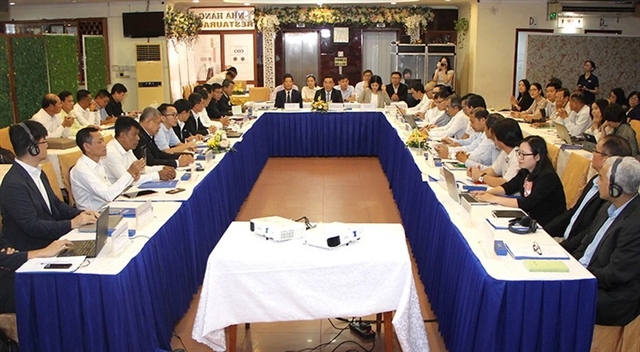 Society
Society

 |
| An overview of the workshop. Photo baoangiang.com.vn |
HÀ NỘI – More than 50 experts and senior officials from the Vietnamese and Cambodian ministries of health and eight border provinces attended a workshop held in the Mekong Delta province of An Giang to discuss emerging infectious diseases and strengthen cross-border collaboration on public health security at national and regional levels.
The workshop on sharing information and developing a cooperation plan for disease outbreak preparedness and response between Việt Nam and Cambodia was jointly organised by the General Department of Preventive Medicine under the Ministry of Health, the International Organisation for Migration (IOM) and the Food and Agriculture Organisation of the United Nations (FAO) in Vietnam.
Experts from Việt Nam and Cambodia reviewed the implementation of the border quarantine agreement signed by the governments of the two countries in 2009, and identified gaps and needs in existing public health practices at provincial, national and regional levels.
Participants at the workshop got updated information on emerging diseases, such as H5N1 avian influenza as well as best practices and lessons learned from border provinces in enhancing cross-border collaboration and joint interventions. They also discussed progress of disease preparedness and response, new challenges, especially the close connection between human and animal movement to public health and health security.
The World Health Organisation (WHO) on August 14 declared the mpox virus, which is rapidly spreading across several African countries, a public health emergency of international concern.
Việt Nam experienced H5N1 avian influenza outbreaks in six provinces, including southern Long An province, which borders Cambodia, in the first quarter of 2024. In March, the country confirmed its first human death from H5N1 avian influenza in a decade, followed by its first human infection with H9N2 avian influenza in April.
Since the beginning of this year, three Cambodian provinces bordering Việt Nam have reported nine human cases of H5N1 avian influenza, including one death. The continued spread of infectious diseases across borders calls for the increased mobilisation of global and regional public health resources to better monitor and respond to these threats.
The workshop highlighted the need for enhanced collaboration and partnerships to urgently mitigate the effect of transnational public health threats, thus requiring immediate cooperative action and contingency strategies, particularly at Points of Entry (POE).
According to Aiko Kaji, Migration Health Programme Manager at IOM Vietnam, emerging diseases, such as H5N1 avian influenza and mpox, have shown that global health security requires collaborative efforts across countries. These diseases pose a significant threat to the international community due to the ease of population movements, the commercial trade and the potential for rapid spread, she continued.
She suggested the governments of Việt Nam and Cambodia to adopt the One Health approach to implement mobility-sensitive and multi-sectoral public health interventions, adding that enhancing the One Health capacity at border regions is vital as these areas are vulnerable to the rapid spread of infectious diseases, including those that can pass from animals to humans. The cross-border movement of people, animals and goods can carry pathogens across regions, making POE crucial for disease surveillance and public health interventions, she said. VNS




